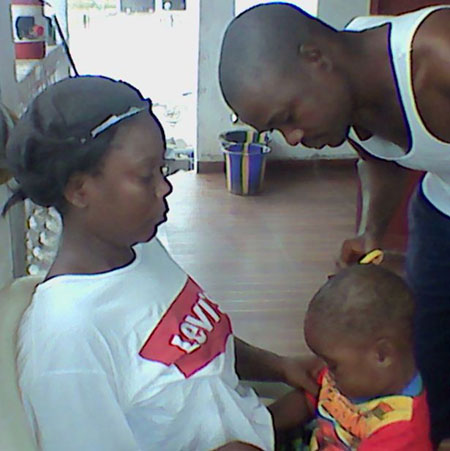|
查看原文
Tom Parry reports from the Ebola front line, where the World Health Organisation admits the death toll of 1,145 “underestimates the magnitude of the outbreak”.
Seven days ago Oliver Wilson drove his sick, shivering wife Layson to an isolation clinic for suspected cases of Ebola.
The 33-year-old nurse, knew from her symptoms that she had contracted the world’s most feared virus.
She knew also that she was about to die from the incurable disease.
But she had stopped short of telling Oliver.
And she deliberately didn’t hug their one-year-old son Oliver Junior as she walked alone through the quarantine tape surrounding the tin-roofed hospital unit.
Her fear that she could infect the tot through a drop of sweat or a stray tear was based on sound knowledge.
Yesterday grief-stricken Oliver wept and banged his head against the steering wheel of the family car as he watched Layson’s body chucked unceremoniously on to the back of a truck in a white plastic bag.
He had been denied the chance to say goodbye to his childhood sweetheart.
In a macabre scene, the corpses of seven other Ebola victims – including a six-year-old boy – were loaded on to the flatbed lorry.
I looked on aghast as grimly determined mortuary workers, clad head to toe in protective clothing, tipped Layson’s corpse off a stretcher – like earth from a wheelbarrow.
Here in the hellish Ebola zone of West Africa, the victims’ remains have to be cremated quickly as even the dead are contagious.
This is the heart-breaking drudgery of life in disease-racked Liberia, where the worst outbreak of this violent disease in history claims fresh lives daily.
The World Health Organisation admitted that the official death toll of 1,145 in the region “vastly underestimates the magnitude of the outbreak”.
For Oliver, a former UN aid worker, the swiftness of his beautiful wife’s decline remains impossible to understand.
Speaking through bursts of stifled sobs, he details with amazing clarity how Layson went down with the incredibly contagious Ebola virus.
I talk to Oliver from outside the cab of his 4x4 vehicle where he sits – through fear of getting too near to him.
My instinct would be to offer a sympathetic hand, but I have been told about the risks of getting too close to someone who might have embraced his Ebola-stricken wife 10 days before.
“I’m trying to be strong, but it’s so hard,” Oliver, 36, stammered. “She died on Saturday; yesterday evening.
“She caught Ebola at work, at the Catholic Hospital here in Monrovia. The hospital administrator had got ill.
“He tested positive for Ebola.
“It was my wife’s job to give him an ECG examination, to put the pads on his body.
"She knew she had to put plastic gloves on, but for a few seconds she was touching him with her hands, to help him get off the bed and on to a chair.
"That is how she got it. A few days later, that man died.
“It was on August 3, when we came home from church, that she complained of -shivering, of feeling chilly.”
Oliver explained how Layson was determined not to be a burden, and so tried to get better with medicine she bought from a local chemist.
The middle-class couple, who wed in 2007, had always been active, outgoing members of the community.
Four years ago, they used their savings for a dream holiday in the United States, and Layson hankered after another trip abroad.
He proudly showed me a photograph of Layson on his mobile phone.
He snapped her posing in a snowbound street, a treasured memento. Layson desperately didn’t want to be ill.
She entered nursing in 2005, and had been promoted several times to obtain a senior position.
After Oliver lost his job at the UN, she became the family’s breadwinner. Now he has no idea how he will support their son.
“On the Monday evening she said she was too hot,” Oliver continued.
“She wanted cold water on a towel to put on her forehead. By Wednesday she had lost her appetite.
"On Thursday the weakness had got worse and she told me she felt nauseous.
“It was last Saturday that she became really ill. It was our son’s first birthday.
“She slept in the living room because I think she knew what was happening to her.
"She said, ‘Oliver, don’t touch me.’ She couldn’t touch Oliver Junior either, and she had to stop breastfeeding him instantly because it is contagious through all body fluids.
“She was so weak she couldn’t even sing Happy Birthday to our son.”
The symptoms Oliver described chart the classic, rapid downfall in healthy people caused by debilitating Ebola.
The European Centre for Disease Prevention and Control said Ebola started with fever, muscle aches, weakness, headaches and sore throat.
The next stage is often characterised by vomiting, diarrhoea, rash and malfunction of the liver and kidneys.
Worst of all, some patients have severe internal and external bleeding and multiple organ failure.
Survival rates are less than 40%, and there is no vaccine or treatment, although a trial is underway in Liberia.
That is why the capital Monrovia is currently gripped by paranoia and -suspicion over the spread of the disease.
“I brought her here later that day, eight days ago,” Oliver said, as we wait outside the clinic for his wife’s final journey.
“Within a week she was dead. I never got a chance to say goodbye. I could only speak on the phone.
"The last time we spoke, she told me her heart had stopped beating too fast.
“She said, ‘Don’t worry, I’ll be fine.’ Now I am here to watch her be carried out in a bag.”
The unemotional professionalism of the Red Cross workers hired to dispose of Ebola bodies is a shocking sight.
For Oliver, it must be unimaginably painful.
Security guards in front of the desperately overcrowded unit continue to chat while the bodies are loaded.
One woman laughed loudly, seemingly oblivious to the grim loading up process taking place behind her.
Throughout Monrovia there are huge advertising hoardings warning people of the dangers.
Yet in the filthy slums, many seem to be going about their Sunday afternoon business as normal.
Torrential rain fell all day, turning the shanty town tracks into a putrid quagmire.
It must be the ideal breeding ground for a virus so contagious a quick touch on the arm from a sufferer is apparently enough to spread it.
By the time you know you should have been more careful, it might already be too late.
Wracked by the loss of his beloved wife, Oliver also feared that he too might have Ebola.
Incubation can take up to 21 days. “I might have it,” Oliver admitted.
“I feel fine now, but it is very likely. Until she got Ebola, I didn’t understand how scary it is.
"Now I’m terrified for our son too.”
As the back panel on the truck carrying Layson’s body was slammed shut, Oliver shuddered.
A disease he had not heard of six months ago has ruined his life in less than a fortnight.
|
查看譯文
據(jù)英國(guó)《鏡報(bào)》記者湯姆?派瑞(Tom Parry)8月17日?qǐng)?bào)道,世界衛(wèi)生組織承認(rèn)“嚴(yán)重低估埃博拉疫情影響性”����,目前該病已造成1145人死亡�����。
10日�,奧利弗?威爾遜(Oliver Wilson)的妻子勞森(Layson)全身哆嗦,疑似感染埃博拉病毒���,奧利弗遂將其送往隔離監(jiān)護(hù)區(qū)�����。
33歲的護(hù)士勞森根據(jù)發(fā)病癥狀判斷自己可能感染了世界上最可怕的病毒埃博拉�。她深諳自己即將死于該不治之癥。然而�,她決定不告訴丈夫奧利弗。
當(dāng)她獨(dú)自走過(guò)鐵皮屋頂醫(yī)院附近的隔離帶時(shí)�,她不敢擁抱一歲大的兒子小奧利弗。
這種恐懼源于其健全的醫(yī)療知識(shí)��,哪怕只是一滴汗水或眼淚都有可能將疾病傳染給她的孩子�。
16日,當(dāng)奧利弗看到妻子勞森的遺體被裝入白色塑料袋并被粗魯扔進(jìn)卡車(chē)車(chē)廂時(shí)���,他心碎欲絕����,淚流滿面��,用力將自己的頭撞在家庭汽車(chē)的方向盤(pán)上����。
他始終無(wú)法獲得許可去見(jiàn)青梅竹馬戀人的最后一面。
這是一個(gè)令人毛骨悚然的場(chǎng)景:七具埃博拉病毒患者遺體被運(yùn)往平板卡車(chē)���,其中包括一名六歲男孩�。
嚴(yán)肅堅(jiān)定的殮房工人穿著從頭到腳的防護(hù)服,將勞森遺體從擔(dān)架卸下���,像是從獨(dú)輪手推車(chē)卸下沙土一般�。這一幕使我看得目瞪口呆����。
在地獄般的西非埃博拉疫區(qū),病毒感染者的遺體會(huì)傳染病毒���,因此必須盡快將其遺體火化�。
在疫情蔓延的利比里亞(Liberia)�,殮房工人是一份令人心碎的苦差。這場(chǎng)史上最嚴(yán)峻無(wú)情的疾病正日復(fù)一日地吞噬著鮮活的生命���。
世界衛(wèi)生組織承認(rèn)“嚴(yán)重低估埃博拉疫情影響性”,目前該病已造成1145人死亡����。
前聯(lián)合國(guó)救援工作者奧利弗至今無(wú)法接受,他與美麗妻子轉(zhuǎn)瞬陰陽(yáng)相隔�。
他不住地哽咽,詳細(xì)地描述了勞森如何感染極具傳染性的埃博拉病毒�。
奧利弗坐在他4X4的車(chē)子里�。我在駕駛室外與他交談�,避免太靠近他。
出于人的天性���,我本想向他伸出同情之手��,但先前曾有人提醒過(guò)我靠近奧利弗有一定風(fēng)險(xiǎn)���,因?yàn)樗赡茉?0天前曾擁抱感染埃博拉病毒的妻子。
“我努力堅(jiān)強(qiáng)起來(lái)���,但那太難了��?!?6歲的奧利弗結(jié)結(jié)巴巴地說(shuō)��。她是周六去世的��,就在昨晚���?��!?/p>
“她在蒙羅維亞(Monrovia)天主教醫(yī)院工作����,在那里感染了埃博拉病毒����。醫(yī)院負(fù)責(zé)人之前已感染病毒?�!?/p>
“他在埃博拉檢測(cè)中呈陽(yáng)性反應(yīng)�。”
“我妻子的工作是為他進(jìn)行心電圖檢查�����,將儀器放在他身上���?���!?/p>
“她知道自己得戴上塑料手套��,但由于要幫助病人下床坐到椅子上��,有幾秒鐘她的手會(huì)直接接觸到病人身體�����?�!?/p>
“這就是她感染病毒的過(guò)程����。幾天后,那個(gè)病人去世了��?���!?/p>
“8月3日,我們從教堂回到家里���,她開(kāi)始抱怨覺(jué)得冷����,還渾身哆嗦�����?!?/p>
奧利弗還談到�,勞森如何決定不成為他人負(fù)擔(dān)�����,所以從當(dāng)?shù)厮幏抠?gòu)買(mǎi)藥品���,希望盡快好轉(zhuǎn)�����。
2007年��,這對(duì)中產(chǎn)階級(jí)夫妻結(jié)婚����,他們一直是社區(qū)活躍外向的成員��。
四年前����,夫妻倆用存款實(shí)現(xiàn)了美國(guó)度假夢(mèng),此后勞森盼望能再一次到國(guó)外旅行�����。
他自豪地向我展示手機(jī)里一張勞森的照片���。
在大雪覆蓋的街道��,他抓拍了一張勞森的身影�����,這是極為珍貴的紀(jì)念����。勞森極度渴望自己從未感染病毒��。
2005年���,勞森進(jìn)入護(hù)理行業(yè)����,此后多次獲得晉升�����,擔(dān)任了高層人員。
奧利弗失去聯(lián)合國(guó)的工作后����,勞森成為家庭主要經(jīng)濟(jì)來(lái)源。如今��,奧利弗不知道該如何撫養(yǎng)他們的兒子����。
“4日夜晚,她說(shuō)覺(jué)得很熱���?����!眾W利弗繼續(xù)說(shuō)道�����。
“她想要把冷水把毛巾弄濕�,敷在額頭上���。6日��,她已經(jīng)毫無(wú)食欲�。”
“7日����,她的身體變得更加虛弱���,她跟我說(shuō)覺(jué)得惡心想吐�?���!?/p>
“9日,她真的生病了�����,那天是我們兒子的一周歲生日���?����!?/p>
“她睡在客廳���,我想那是因?yàn)樗兰磳l(fā)生什么事��?��!?/p>
“她說(shuō):‘奧利弗,別碰我��?��!膊荒芙佑|小奧利弗�����,且不得不立刻停止給他喂奶�,因?yàn)樗畜w液都可能傳染病毒����。”
“她十分虛弱��,甚至沒(méi)有力氣為我們的兒子唱生日歌����?�!?/p>
奧利弗描述的癥狀具有典型性����,埃博拉病毒能使健康人在短時(shí)間迅速變得虛弱�����。
歐洲疾病防控中心(the European Centre for Disease Prevention and Control)表示�,埃博拉病毒感染初期���,會(huì)出現(xiàn)發(fā)燒��、肌肉酸痛����、身體虛弱���、頭痛和喉嚨痛等癥狀��。中期常出現(xiàn)嘔吐���、腹瀉���、皮疹、肝功能失調(diào)和腎功能失調(diào)等癥狀�����。在末期����,患者會(huì)出現(xiàn)嚴(yán)重的內(nèi)出血、外出血和多器官功能衰竭�。
盡管有人在利比里亞進(jìn)行相關(guān)試驗(yàn),但目前該病無(wú)任何疫苗或治愈方法�,康復(fù)率低于40%。
因此��,首都蒙羅維亞近日因疫情蔓延而陷入疑神疑鬼氣氛中����。
“9日那天晚些時(shí)候,我把她帶到這兒�����?���!眾W利弗說(shuō)道��。他正在診所門(mén)外等候��,目送妻子最后一程��。
“短短一周�����,她就撒手人寰了����。我沒(méi)有任何機(jī)會(huì)見(jiàn)她最后一面�����,只能在電話中與她交談��?!?/p>
“最后一次通電時(shí)�����,她告訴我心跳恢復(fù)正常了?���!?/p>
“她說(shuō):‘別擔(dān)心,我會(huì)康復(fù)的�。如今,我卻在這兒看著她被裝進(jìn)塑料袋里被抬走�����?�!?/p>
紅十字會(huì)所雇傭處理埃博拉病毒感染者遺體的工作人員表現(xiàn)出冷靜沉著的敬業(yè)精神����,著實(shí)令人震驚。
對(duì)奧利弗而言����,這無(wú)疑是不可想象的喪妻之痛。
當(dāng)工作人員忙著搬運(yùn)遺體時(shí)�����,前方的保安人員繼續(xù)交談。一名女子喧嘩大笑�,看起來(lái)很明顯是針對(duì)她身后殘忍的運(yùn)輸遺體過(guò)程。
蒙羅維亞隨處可見(jiàn)巨型圍墻廣告標(biāo)語(yǔ)����,警示民眾埃博拉疫情危險(xiǎn)性。
然而�����,在骯臟的貧民窟�����,許多人似乎即將開(kāi)始周日下午的生意�,如同往常一樣。
暴雨持續(xù)了一整天�,棚戶(hù)區(qū)變成了散發(fā)腐臭的沼澤地�����。這必定成為埃博拉病毒繁殖傳播的理想溫床���。埃博拉病毒極具傳染性�,即使只是碰了一下病人的手臂,也足以被感染����。也許等你發(fā)現(xiàn)該小心謹(jǐn)慎時(shí),一切都已無(wú)法挽回����。
奧利弗飽受折磨,他不僅失去了心愛(ài)的妻子���,而且害怕自己也可能感染了埃博拉病毒��。該病潛伏期可長(zhǎng)達(dá)21天�����?��!拔铱赡芤呀?jīng)得病了?���!眾W利弗坦誠(chéng)地說(shuō)道?����!拔夷壳案杏X(jué)良好,但很可能已經(jīng)得病�。直到勞森感染病毒,我才知道這病有多可怕?���,F(xiàn)在,我非常害怕兒子也得病了��?��!?/p>
當(dāng)載著勞森遺體的卡車(chē)后板“砰”的一聲被關(guān)上時(shí)���,奧利弗忍不住戰(zhàn)栗發(fā)抖。
半年前���,奧利弗甚至不曾聽(tīng)說(shuō)過(guò)埃博拉�����。如今,埃博拉卻在短短兩周內(nèi)摧毀了他的家庭�����。
(譯者 李文艷 編輯 丹妮)
掃一掃,關(guān)注微博微信
 
|


